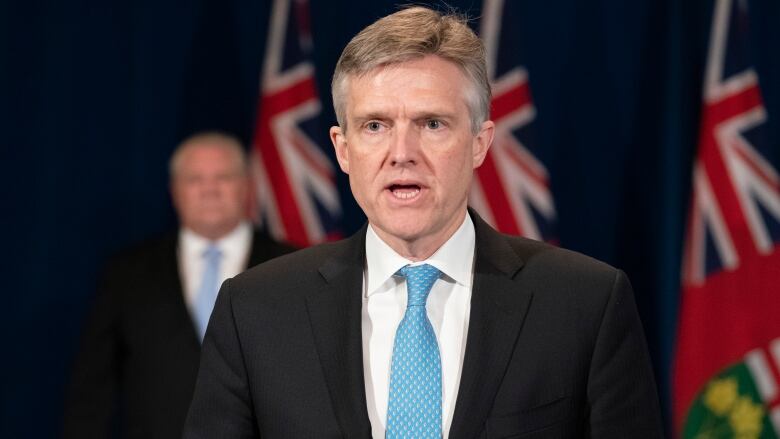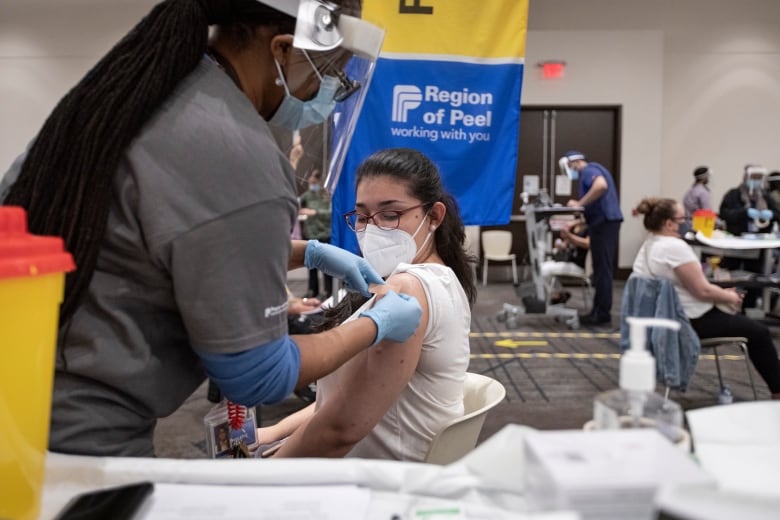Ontario 'failed' LTC residents and families during COVID-19 pandemic, new long-term care minister acknowledges
Province allowing larger outdoor, indoor visits for long-term care residents starting July 7

Ontario's new long-term care ministerRod Phillips apologized Tuesday for a provincial pandemic response that saw the deaths of nearly 4,000 long-term care residents with COVID-19.
Speaking to reporters during his first news conference in the role, Phillips acknowledgedhis own government"failed" residents, their families and staff members.
"Successive governments, including this one, failed residents and failed families. And they failed our staff and on behalf on past governments and the current government I apologize for that. I think that's a necessary step so that we can take the action we need to do now to move forward."
The response was a sharp contrast to the position taken by Phillips' predecessor,Merillee Fullerton, who repeatedly pointed the finger atprevious governments among other factors.
"We didn't start the fire," Fullerton said in an April news conference.
"All of us in government, anyone who has read the LTC report, sees it was over decades that this sector was neglected, that investments weren't made and so accountability rests with all of us who've been in government and, as I said, governments past but also governments present," Phillips said.
WATCH | Rod Phillips apologizes for Ontario's failings on long-term care during pandemic:
The province's322-page Long-Term Care COVID-19 Commission report, issued in April, found Ontario was not prepared to address a pandemic and hadno plan to protect residentsin long-term care thanks to years of neglect.
Philips also hinted at new long-term care legislation that might increase accountability among long-term care providers.
"We have been, for a variety of reasons, less proactive on inspections than we needed to be," he said. "We want to make sure it's clear who has obligations and we'll hold them accountable for those obligations."
Phillips was also asked about the progress made on installing air conditioning in long-term care rooms, to which he replied that while all facilities are equipped with it, only about 60 per cent of rooms have air conditioning.
The government is now working on rolling out air conditioning toanother 23 per cent of rooms.
"This is a priority for me," he said, on a day when Toronto saw humidex values of 40.
Phillips resigned from his post as minister of finance late last year after it was revealed he took a weeks-long Caribbean vacation over the Christmas holiday while his own government advised against travelling
He was made minister of long-term care as part of alarge-scale cabinet shuffle earlier this month, when he replaced Fullerton in the role.
Ontario loosening restrictions on visits for LTC residents
Also announced Tuesday, Ontario is further easing restrictions on long-term care homes, with residents now able to have outdoor visits of up to 10 people and indoor visits of up to two general visitors and two caregivers, effective July 7.
The changes mean residents will be able toaccess personal care services and relaxed cohorting during outdoor activities. There were will also be no limit on the number of people who can be designated a caregiver by a resident or substitute decision maker.
Meanwhile, the province reported 209 new COVID-19 casesthe lowest daily case count since mid-September, on the eve of moving into Step 2 of the government's reopening plan.

Tuesday's case count comes as health units across Ontario collectively administered 265,231doses of vaccines yesterday a newhigh.
Notably, the Ministry of Health's official report today cited299 further cases. Ninety of those infections, however, were from 2020 and were included today as part of a "data review and clean-up" by Toronto Public Health.
The ministry also reported an additional 25deaths this morning, but 19 of them were from "previous months" and were added as part of a separate data review by Public Health Ontario.
Thenewly-recorded deaths bring the official death toll in the province to 9,154.
Delta variant remains a concern as Ontario enters Step 2
At a news conference Tuesday afternoon, Associate Medical Officer of Health Dr. Barbara Yaffe, said the productive number for delta variant stands at one, meaning the overall number of new cases associated with the variant is growing.
"To maintain the progress that we have made, the most significant thing that everyone can do is to get vaccinated," she said.
WATCH | COVID-19 delta variant remains a concern as Ontario enters Step 2, says Dr. Moore:
"This delta strain is proving very difficultto control and it will take asignificant amount of work," Chief Medical Officer of Health Dr. Kieran Moore said.
"It's aggressive, it wants to spread rapidly," Moore said, adding the variant can go from one person to six to 36 to 216 in a period of three to five days.
Moore and Yaffe also encouraged those in harder-hit areas, including Waterloo, not to travelto other regions without ensuring they are fully immunized and to consider meeting outdoors rather than indoors to avoid adding to the spread of the virus.
Moore also emphasized the importance of physical distancing and masking as most of Ontario enters Step 2 of the province's reopeningplan at 12:01 a.m. Wednesday, and said he would like to see the province remain in that step for 21 days before moving to Step 3.
Meanwhile, Ontario is working on guidance for fully vaccinated individuals following the guidelines released by the federal government. It should be released soon, Yaffe said.
35% of Ontarians fully vaccinated, province says
Excluding the cases that artificially inflated today's total count, the province's seven-day average of new daily infections now sits at 266.
Meanwhile, Ontario's lab network completed 28,306tests more than double the amount logged on Monday. Public Health Ontario logged a test positivity rate of 1.6 per cent.
As of yesterday, 276 people were being treated for COVID-related illnesses in intensive care units. Some 185 of those patients were on ventilators.
At 12:01 a.m. Wednesday, all but one of Ontario's 34 public health units will move into Step 2 of the province's reopening plan, as the province slowly rolls back pandemic restrictions that were introduced to quell a deadly third wave of infections this spring.
That phase of the reopening plan will allow indoor gatherings of up to five people and see hair salons resume operation for the first time in months.
Provincial data said as of Tuesday, more than 77 per cent of adults had received at least one dose of a COVID-19 vaccine and more than 35 per cent were fully vaccinated.
Those vaccination rates meet the criteria laid out for entering Step 2 and Step 3 of the reopening plan, though officials have said they'll proceed cautiously before loosening restrictions further.
Ontario's reopening plan leaves 21 days between each step to monitor public health indicators.

Dr. Isaac Bogoch, an infectious disease physician and member of Ontario's COVID-19 vaccine task force, says the province is in a "very good place right now" entering Step 2.
"The pace of vaccinations is very, very fast," he told CBC Toronto on Tuesday, adding that the number of people fully vaccinated is "skyrocketing."
Bogoch said as the province continues to up new appointments and expand eligibility for vaccines, the burden of COVID-19 will only lessen further.
While he thinks the province will be ready to enter Step 3 in the next few weeks, he says the province needs to continue to break down barriers to get more people access to the vaccines.
"The job isn't done," he said.
Premier Doug Ford said on Monday that Step 3, which allows more indoor activities and larger crowd capacity outdoors,might come "sooner than later" depending on advice from the province's top doctor.
With files from Julia Knope and The Canadian Press














_(720p).jpg)


 OFFICIAL HD MUSIC VIDEO.jpg)
.jpg)



























































































